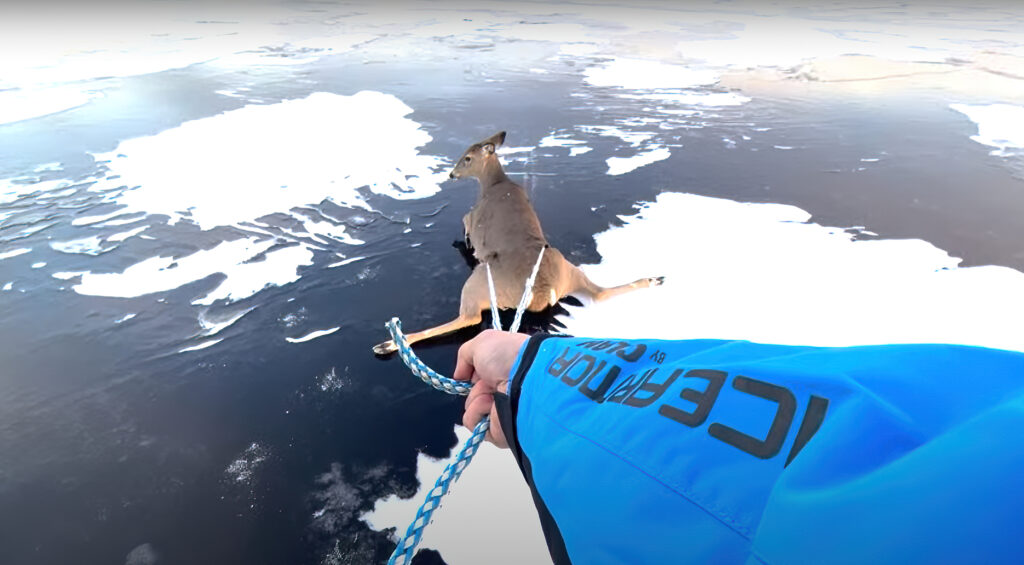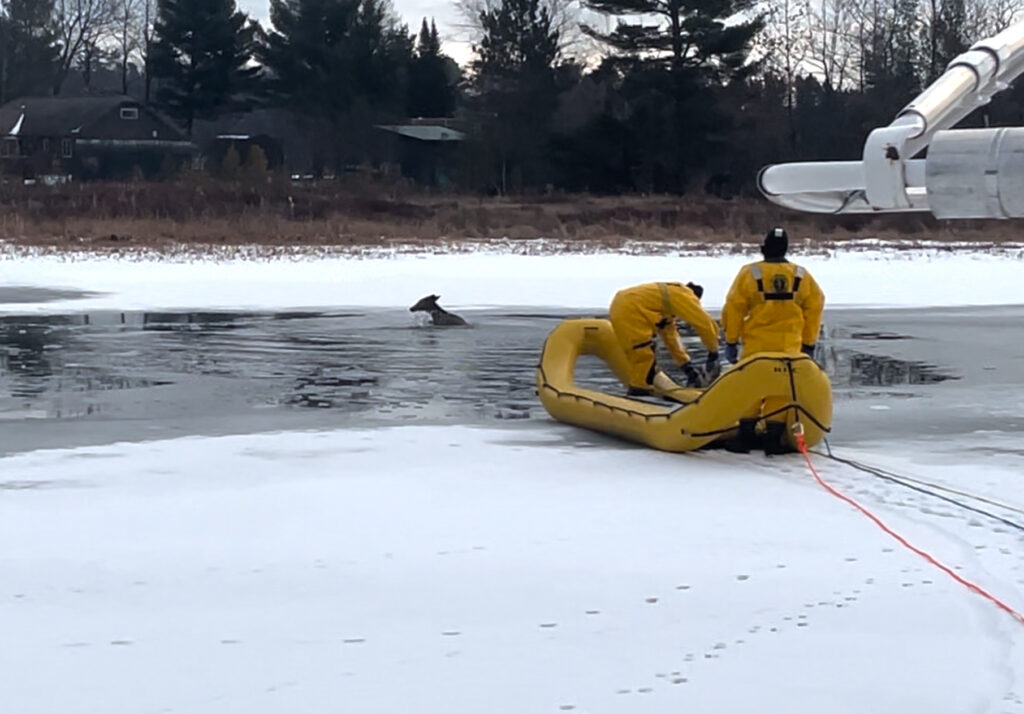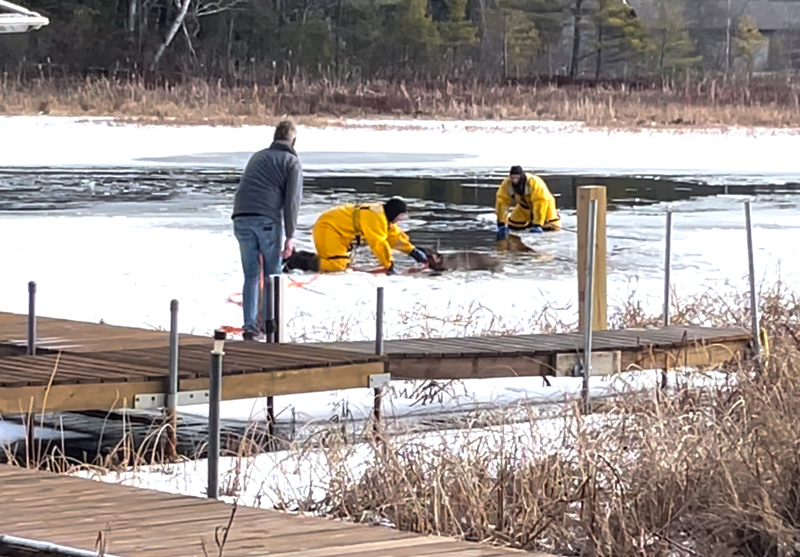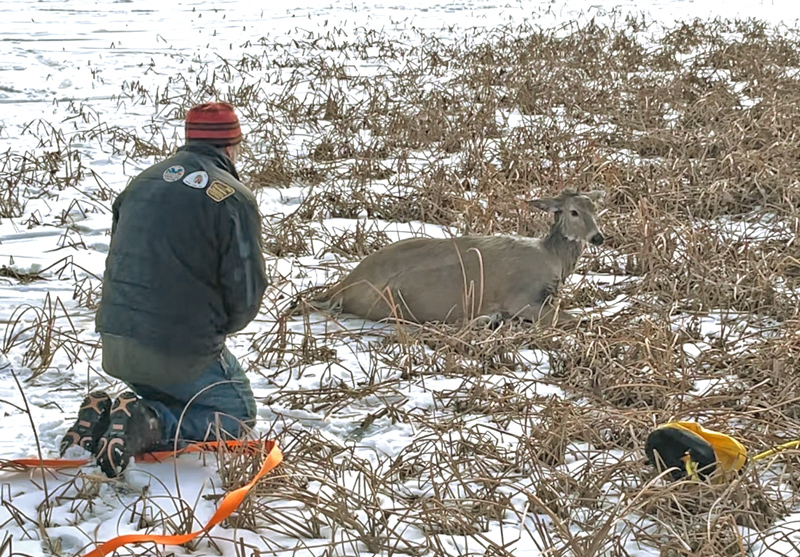
Rescuing White Tailed Deer, Stranded on the Ice and in the Water!
Northern Wisconsin has yet to see any significant snow accumulation. However, it has still been cold enough for lakes and rivers to freeze. And the ice has been great for skating. But some animals will never be good at skating, no matter how hard they try.
After hearing from several homeowners on the lake about a deer stranded on the ice, we knew we had to get out and help her as soon as possible. Whitetail deer do poorly on bare ice. Their hooves are unable to get any traction. And the deer quickly becomes exhausted, just trying to move. After a while, they can’t even stand anymore. The snow on the lake wasn’t even 1/2″ deep, so it provided no additional traction.
We didn’t know how long she was on the ice or why she was even out there. But we did see several sets of coyote tracks. So it’s possible that she was chased out onto the ice. Or, she could have just been trying to get to the other side.
It isn’t uncommon to see an ice-stranded deer in this pose, with their legs splayed like that. If the doe had stayed like that much longer, she might have suffered permanent damage and been unable to walk ever again.
But thankfully, we got there in time. With help from one of the homeowners on the lake, we got her to shore and off the ice. She was tired but had enough strength to regain her legs and walk into some tall grass and shrubs, where she promptly laid down for some much-needed rest. She started out a little wobbly but quickly regained her balance and looked solid on her feet. So we left her there, confident she would be just fine after she had some time to rest and recover from an undoubtedly traumatic experience!

It was only a short time after the first deer call that we got another one. This time, it was about a deer caught in open water in a channel connecting Minocqua Lake to Tomahawk Lake. In the summertime, it is popular among boaters and fishermen. But in the winter, it freezes over, mostly.
The “channel” is known to be very dangerous because the ice tends to be very thin. This poor doe didn’t realize that and fell through as it tried to cross the ice. When we arrived, she was swimming around in circles, occasionally trying to get up on the ice and out of the freezing water.
We came prepared for an open water rescue, with a dry suit, a canoe, lots of rope, flotation, and a chainsaw. The chain saw would be used to cut a channel to shore.
Once we arrived, we learned that the Minocqua Fire Department was also on the way. This was a relief because while we were ready to go out on the ice, we weren’t too excited about it. And, the Minocqua Fire Department was equipped with gear and training we didn’t have, so we were happy to let them take the lead and provide whatever assistance they might need – which mostly amounted to managing a safety rope for one of the rescuers!

While our concern over the doe never waned, watching the fire department crew and seeing how they might utilize those same skills to rescue a human in the same situation was very interesting. But it took them a while to navigate to the deer because a lot of broken ice and moving water hindered their movements.
Ultimately, one of the firefighters had to get in the water, where he could get one of our straps around the deer. Because of the difficulty of swimming through water congested with ice, he could only get the strap around her neck. For obvious reasons, that’s not ideal. But the conditions he was working in did not afford much opportunity to loop the deer in any better way. And given the situation and the amount of time the deer had already spent in the water, they had to do whatever they could.

Once the fireman had the strap around the doe, he could quickly pull her through a channel the other firefighters cut through the ice. The fireman got her up on the ice, and she wobbled into some reeds and plopped down exhausted. We could provide a cursory examination and thankfully saw no apparent injuries. After a few minutes, she got up and casually walked away as if nothing happened!

Inspecting the doe for injuries after she got out of the icy water.
We want to thank the Minocqua Fire Department for their heroic efforts in saving this beautiful doe. It’s just one example of our community‘s collective commitment to the well-being of wildlife and how we come together to help when needed.
If you think these efforts are as important as we do, please consider donating. The Northwoods Wildlife Center is a non-profit organization and relies on your support to continue its mission of rescuing and rehabilitating wildlife in need.